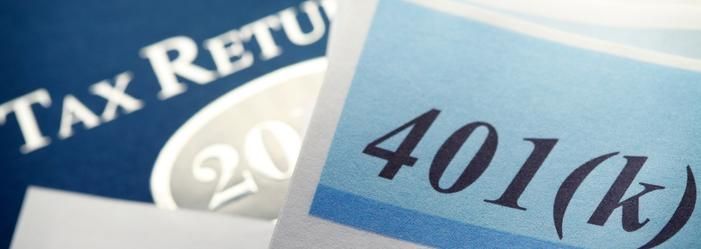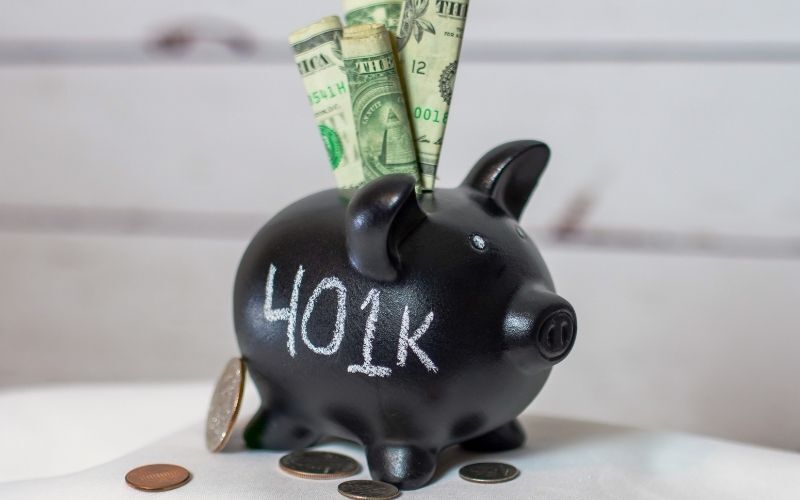Last Updated: October 17, 2023
When You Should (And Shouldn't) Borrow From Your 401k

If you need money and are looking for sources, your 401k might seem like a great place to draw money from. After all, it is for the future while the present is staring you right in the face. Surely, you will have time to rebuild that money before retirement, right?
While both statements are technically true, let’s take a look at the pros and cons of withdrawing money from a 401k or other retirement accounts.
What is a 401k?
A 401k is a retirement account set up by your employer to which you contribute a portion of your wages. Some employers will match your contributions. There are other retirement accounts such as Individual Retirement Accounts that are set up by you.
Since the 401k is more common, we’ll address those specifically. If you have another retirement account, speak to a qualified person, such as a CPA, before you withdraw money.
When you put money into a 401k, it is invested into some sort of growth stocks, bonds, cash, and mutual funds. You’ll decide on those investments when you start the account and can change them periodically. Hopefully, the money then grows and will be withdrawn to help fund your retirement.
Always take advantage of 401k opportunities and if you can, deposit as much as you can. If your employer matches up to a percentage of your contribution, try your best to meet that percentage for maximum return.
For instance, your employer matches up to 5% and you make $25,000 a year. You deposit $1,250 a year and your employer matches that - you now have $2,500 total added to your 401k. Of course, you may be able to deposit more without a match. If you can, take advantage of that.
401k Loans and 401k Withdrawals
There are two different ways to withdraw money from a 401k prior to age 59½. A 401k loan allows you to borrow as much as 50% of your savings within a 12-month period.
Loan Pros
- Interest paid goes back into your 401k
- The loan amount eventually is repaid
- Missing a payment or defaulting is not reported to credit bureaus.
Loan Cons
- Leaving the job before repayment requires repayment more quickly
- Defaulted loans require you to pay taxes and a 10% penalty if under 59½
- Potential growth from loans is not realized
A withdrawal means that you do not have to repay the money, but you do have a penalty and taxes to pay. You must also meet certain guidelines set by the IRS. For the purposes of this blog, we’ll assume that you are taking out a withdrawal.
Should You Take a 401k Loan Instead?
Taking a 401k loan allows you to borrow money from your 401k rather than withdrawing it. This can be a better option than withdrawing in some cases because you avoid taxes and penalties as long as you pay the loan back.
You should first consult a tax advisor before you withdraw any money from a 401k account.
Some key points on 401k loans:
- You can typically borrow up to 50% of your vested 401k balance or $50,000, whichever is less.
- The loan is paid back over 1-5 years with interest.
- If you leave your job before repaying the loan, it usually must be paid back quickly to avoid taxes and penalties.
- While the loan is outstanding, that money is not invested and growing for retirement.
A 401k loan makes sense if you need money temporarily and know you can pay it back quickly. It's not a good option if there is any chance you may default on the loan.
What Are Your Other Options?
Before withdrawing from your 401k, consider these other potential options:
- Cut expenses temporarily
- Seek help from family or friends
- Take out a personal loan from a bank
- Use a 0% credit card offer
- Tap into home equity if you own a home
- Sell assets you no longer need
While not ideal, these may allow you to avoid long-term damage to your retirement savings. Explore all options before deciding to withdraw from your 401k.
Compare 401k Withdrawal to Other Options
Withdrawing from your 401k has major downsides compared to other potential options:
- 401k Loan: The interest rate on a 401k loan is typically low (often prime rate or slightly higher). And you avoid taxes/penalties as long as you repay the loan. The main risk is defaulting on the loan if you leave your job.
- Personal Loan: While interest rates are higher than a 401k loan, a personal loan from a bank avoids early withdrawal penalties. It also doesn't put your retirement at risk.
- Credit Card: A 0% intro APR credit card could provide over a year of interest-free financing. Paying off the balance before the intro period ends minimizes overall cost.
- 401k Withdrawal: This option triggers income taxes and a 10% penalty if you're under 59.5. And you lose out on all future tax-deferred growth on the amount withdrawn. The overall cost is very high.
Unless you've exhausted all other options, a 401k withdrawal should generally be avoided if at all possible.
Taxes and 401k

When you or your employer puts money into a 401k, it comes out of your pretax income and you do not pay federal income tax on that contribution. However, the IRS wants a cut of your income and so the money is taxed when you withdraw it. If you withdraw money from a 401k before age 59½, you are penalized for that withdrawal.
You will pay a 10% early withdrawal penalty plus state and federal taxes. This takes a big chunk out of your 401k. For instance, you withdraw $10,000. You’ll pay $1000 in penalties. The IRS then takes 24% or $2,400 and if your state has an income tax, you get more taken out.
At a minimum, you are left with $6,600 and you have lost potential growth from that $10,000. Since you can not repay that $10,000, you are out of money. In addition, the withdrawal may bump you up into a higher tax bracket and you will pay more taxes for the year.
For example, if you withdraw $10,000 from your 401k before age 59.5.
Here is what you might pay in taxes and penalties:
- 10% early withdrawal penalty: $1,000
- Federal income tax (assuming 24% bracket): $2,400
- State income tax (assuming 5% rate): $500
In this scenario, you would end up with only $6,100 out of your $10,000 withdrawal after paying taxes and penalties. Make sure you understand the impact before taking money out of your 401k.
Long-Term Impact
Cashing out your 401k today can have devastating consequences on your nest egg down the road.
For example:
- Withdrawing $20,000 at age 30 from a 401k and missing out on 30 more years of 8% average annual returns could result in over $500,000 less at retirement.
- Even withdrawing $5,000/year for 5 years in your 30s could mean nearly $150,000 less to retire on.
- The earlier and more frequent the withdrawals, the more severely your eventual retirement is compromised.
- You also lose the power of tax-deferred compounding when you withdraw retirement funds.
The immediate financial relief from a 401k withdrawal can quickly be outweighed by the long-term damage. Being unable to retire or having a much lower standard of living should be the larger concern.
Safe Harbor Distributions
The IRS does allow for certain “Safe Harbor” distributions for people with “immediate and heavy need.” These are defined by the IRS as:
- Medical care expenses for the employee, employee’s spouse, dependents, or beneficiary
- Costs directly related to the purchase of an employee’s principal residence (excluding mortgage payments)
- Tuition, related educational fees, and room and board expenses for the next 12 months of postsecondary education for the employee or the employee’s spouse, children, dependents, or beneficiary
- Payments necessary to prevent the eviction of the employee from the employee’s principal residence or foreclosure on the mortgage on that residence
- Funeral expenses for the employee, the employee’s spouse, children, dependents, or beneficiary
- Certain expenses to repair damage to the employee’s principal residence
You must meet other guidelines to qualify for this type of emergency withdrawal. You are still taxed on the money and may have penalties attached. Before you ask for a Safe Harbor distribution, talk to a certified professional.
Your 401k is protected
One benefit of having a 401k is that the monies within that account are protected from creditors and bankruptcy.
What if this is a 401k from an old job?
If you have a 401k from an old employer, hang on to it and don’t cash it out. You can roll it over to an IRA if you like, but the money is still there, growing interest toward your retirement. If you do not roll it over to an IRA, you can not make contributions to it, so rolling it over may make sense in terms of building your retirement.
The CARES Act
You may have heard that you can withdraw money out of a 401k plan without a penalty because of COVID. This fee waiving was part of the CARES Act of 2020. At the time of writing, this has been extended to March 27, 2022. Whether or not it will be extended again is not clear. Before you withdraw money, check with a certified professional!
FAQs
Conclusion
Before you take money out of your 401k, think seriously about how it may affect your future. You will have to pay taxes and penalties, your future retirement may be affected, and your retirement fund will take a serious hit.
Instead of taking out your retirement money, try to find other ways to raise the money. If you absolutely have no other option, always speak with a certified professional to find ways to minimize the negative effects of withdrawing money from your retirement account.
Consider lower-cost alternatives like 401k loans, personal loans, credit cards, budget cuts, or family help before resorting to 401k withdrawals. Restricting 401k withdrawals to true financial emergencies, especially when it involves significant commitments like your mortgage, is vital. With proper planning and exploring all options, you can likely find a better way than sacrificing your future retirement funds.
If you are struggling with overwhelming debt and want to explore your debt relief options, Pacific Debt Relief offers a
free consultation to assess your financial situation. Our debt specialists can provide objective guidance relevant information and support to help find the right debt relief solution.
✔ Accredited by Better Business Bureau with BBB A+ rating (4.93 rating and 1678 reviews)
✔ US News and World Reports and Bankrate ranked Pacific Debt Relief as one of “The Best Debt Relief Companies of 2024”
✔ 6.9 star rating by BestCompany.com (over 2379 client reviews)
✔ 4.8 star rating by TrustPilot based (over 1613 verified consumer reviews)
✔ ConsumerAffairs.com Accredited (over 544 verified reviews with an average rating of 5 stars)
✔ A Top 10 Rated Compan by TopTenReviews.com , ConsumersAdvocate.com and Top10debtconsolidation.com
✔ 4.6 star rating by Google (229 client reviews)
✔ 100% rating by SuperMoney (9 client reviews)
Reduce Your Credit Card Debt By Up to Half

BBB Reviews | 4.9/5.0 Rating









 Do Not Sell My Personal Information
Do Not Sell My Personal Information